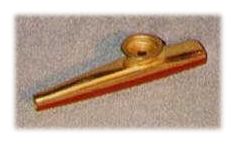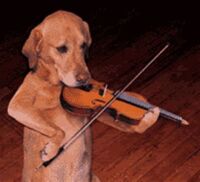Dog whistle
A dog whistle is a whistle for dogs. Its key characteristic is that one audience can hear it while another audience cannot. The typical dog whistle is plastic and less expensive than either the kazoo or the Oscar Mayer wiener whistle — or would be, except that it is mostly sold at pet shops, where the typical pedigreed canine merchandise requires installment payments.
There are a surfeit of things with the same key characteristic as the dog whistle. These are also called dog whistles. In fact, the literal dog whistle has become so expensive that it is vastly outnumbered by the figurative ones.
Literal[edit]
Original dog whistle[edit]
The original dog whistle was specially designed for dogs. It emitted a squeal at a high frequency that dogs can hear and humans cannot. Dogs liked to blow them when it was time for "walkies." Dogs are "man's best friend," but not exactly "the smartest person I know," as Joe Biden once said of Hunter. Tragically, the harder dogs blew them, the equally silent they seemed to the person who was supposed to attach the leash and open the front door. Dogs eventually gave up the habit and simply scratched up the door.
A golden retriever named Max was arguably the most accomplished dog-whistle blower, earning the second chair in the symphony orchestra of Nashua, New Hampshire. However, Max's critics charge that the conductor could not actually discern that the dog whistle was being blown well, but that Max's appointment was an example of "tokenism", as dogs were and still are under-represented in the orchestra.
Rev 2.0[edit]
A follow-on whistle redesigned for the human mouth caught on quickly. It is a common prank to blow the whistle incessantly, driving the neighbor's dog insane for reasons the neighbor cannot perceive.
Figurative[edit]
Race relations[edit]

In politics in the United States, the most common dog whistle is the race relations whistle. This expression refers to the case in which A says something and B says he hears something different. For example, a visitor to the inner city might say one of the following:
- Nice weather we're having!
- We are looking for a subway station.
- Do you realize you have your baseball cap on backwards?
The African-American resident obviously hears, "I wish you and all your ilk were still in leg-irons picking cotton!"
It may shock the visitor to know that he gave offense without meaning to at all, as this means there is no guaranteed way to give offense when you really intend to. However, in the 2020s, white people learned that they can give offense unintentionally, such as by merely waking up or wearing their pants pulled up. Thus, white people must strive for a colorblind society by fixating on skin color "all the live-long day," and be careful what one says when there is one of them nearby.
Party politics[edit]
The realization that a listener might hear a different message than the utteror intended to convey found its greatest use in partisan politics, where it often serves a politician to answer a question other than the one the reporter asked, and later explain that that was simply how he heard it. The reporter's question about my alleged influence-peddling was a dog whistle impugning the honor of my mother.
In its greatest application, everything President Donald Trump said was taken by most listeners as a dog whistle for, "I intend to start World War III." This gambit was so effective that occasionally his adversaries declined to use it and heard exactly what he said, just to throw him off; for example, when he said that one might fight the coronavirus by huffing bleach or LEDs.
The figurative dog whistles inexplicably ceased during the Joe Biden administration, as it took so much time figuring out what the President said that he was on to something else before the listener could decide what he might claim it was a dog whistle for.

